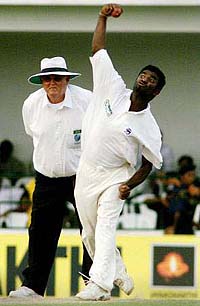 In a recent interview, Monty Panesar has said that although Michael Vaughan is very important to the team, Andrew Flintoff will be just as good. The justification being:
In a recent interview, Monty Panesar has said that although Michael Vaughan is very important to the team, Andrew Flintoff will be just as good. The justification being:"Michael Vaughan likes everyone to be captain out on the field"
So, it doesn’t really matter who is captain, as Vaughan has ingrained leadership onto the entire team. Apparently, the best test of a manager (in the business world) is someone whose loss isn’t noticed, as they have created a stand-alone, functioning outfit that doesn't require mirco-management or constant crisis control. Presumably, Vaughan has constructed a similar framework. Anyway, Monty goes on.
"He's got a lot of experience and led England to an Ashes win. He's very excited about going to the World Cup and it's great to have him.”
Vaughan is good.
"But if Andrew Flintoff replaces him then we are still in a very good position because he's a very good captain who leads from the front. Andrew is an inspiration on and off the field."
But Flintoff is also good.
A fine piece of PR: he said the right things and didn’t put his foot in it. And complied with the normal rules of remaining blindly positive, humble and open. I am wondering whether the spinning superstar might be taking over from Paul Collingwood’s media duties. If so, this paradigm shift would certainly make him into a multi-dimensional cricketer, who is well-adjusted to the information economy and human resourcing through a sustainable holistic synergy strategy.











